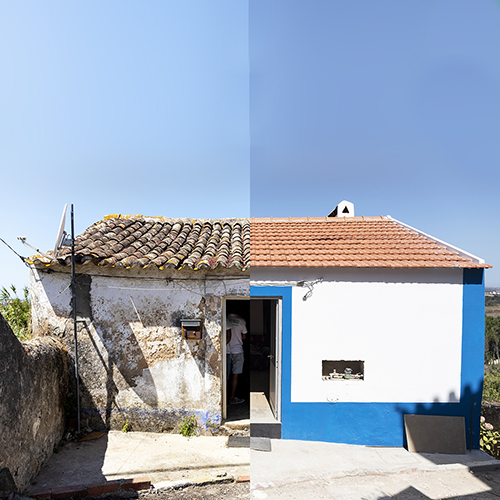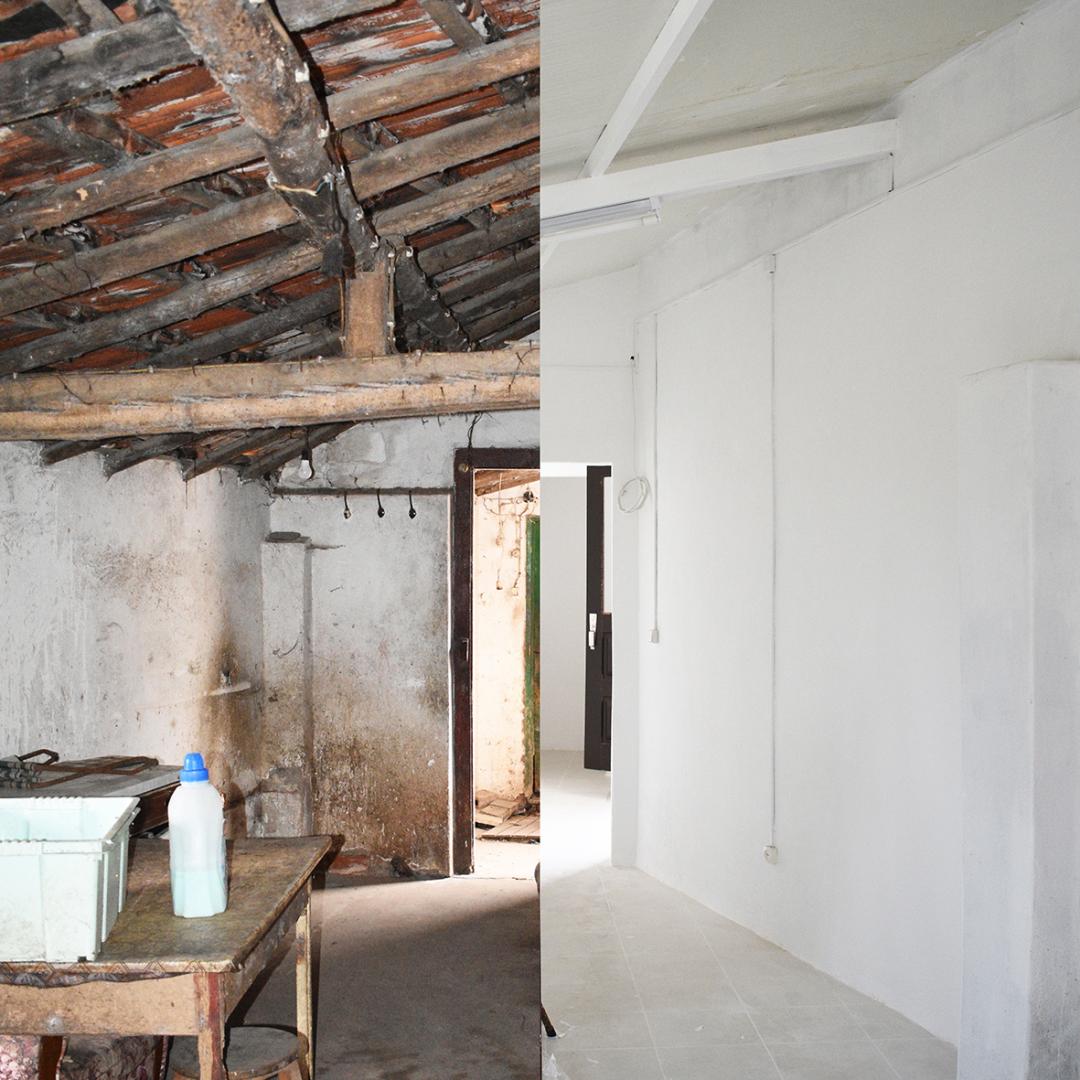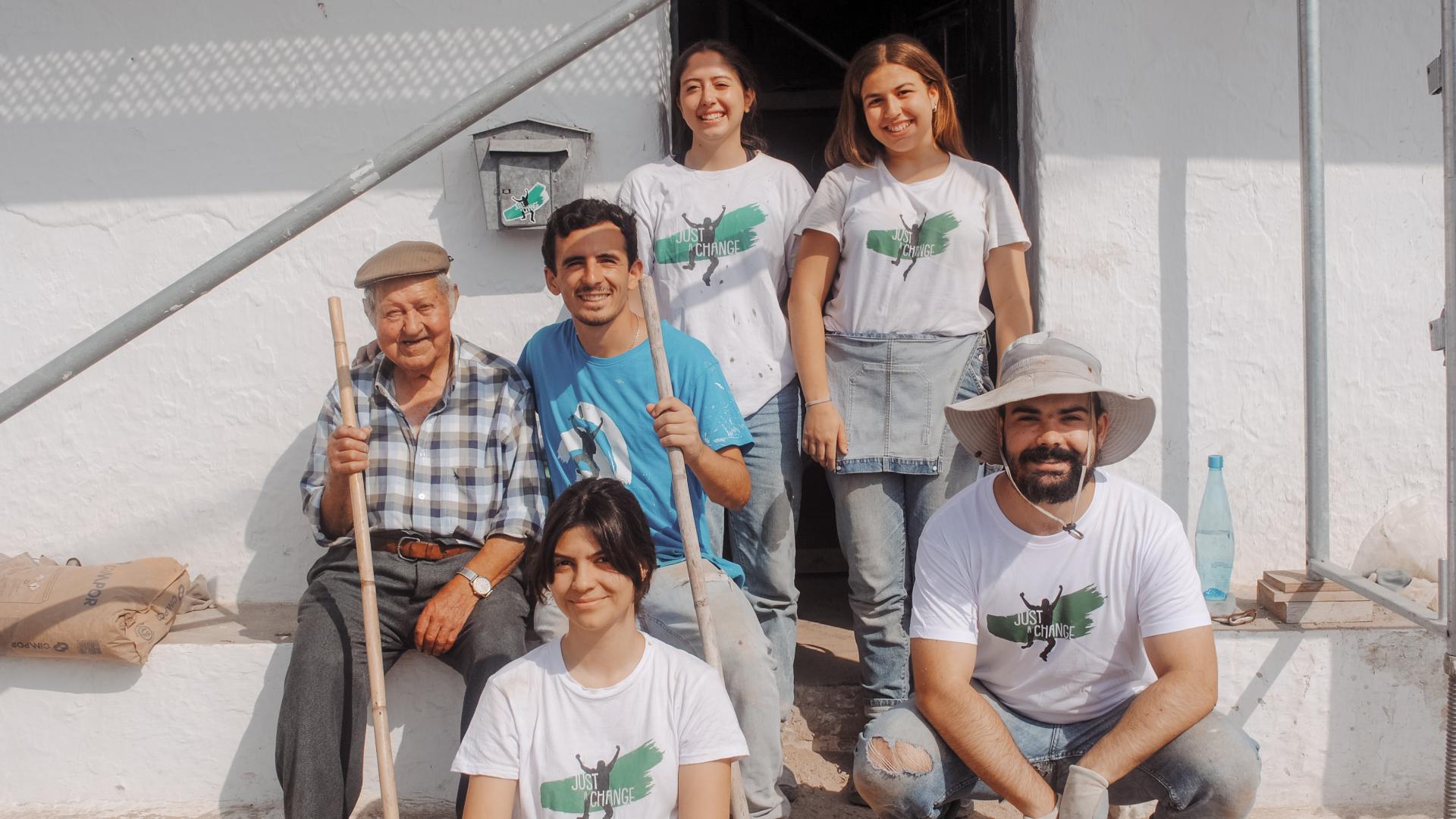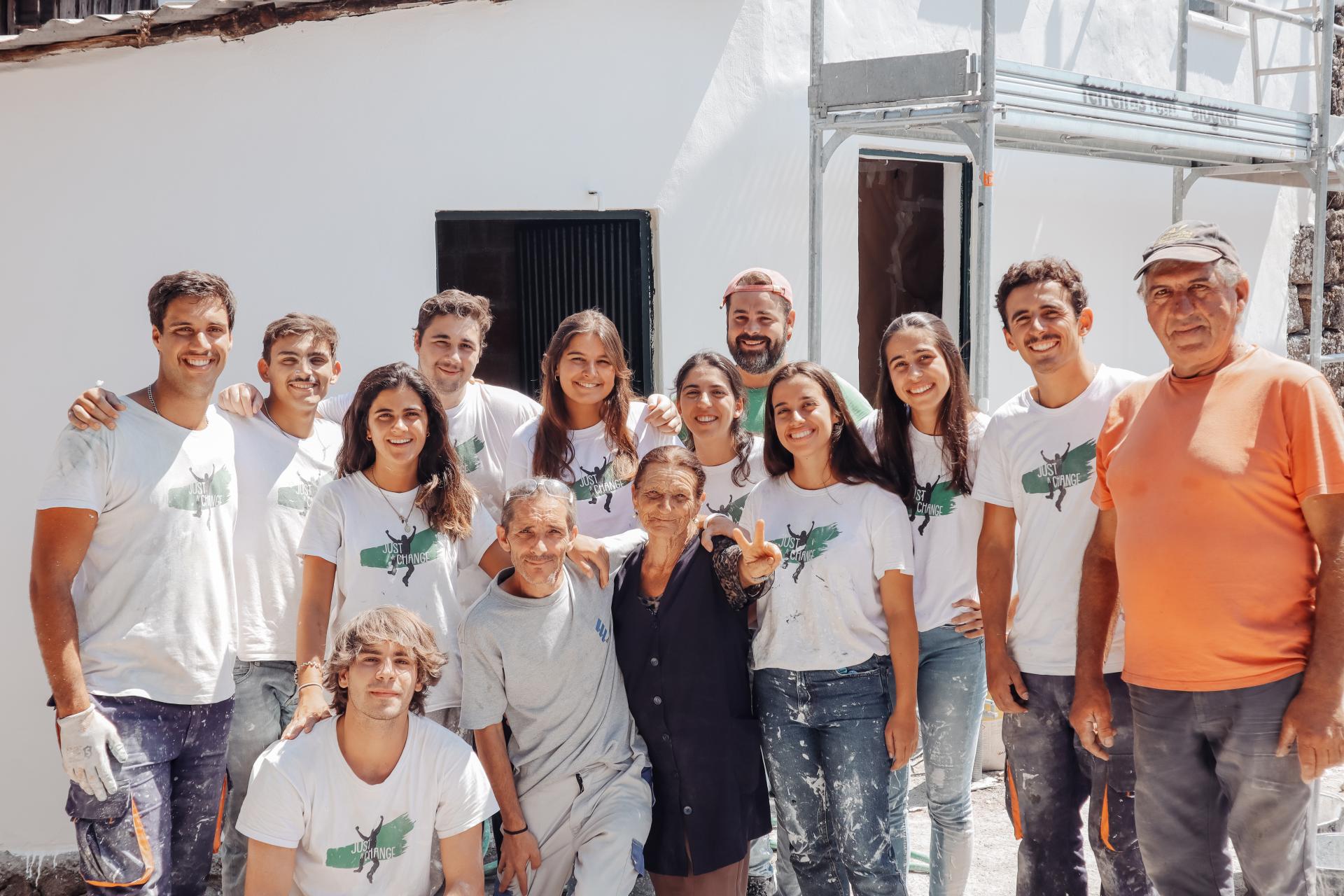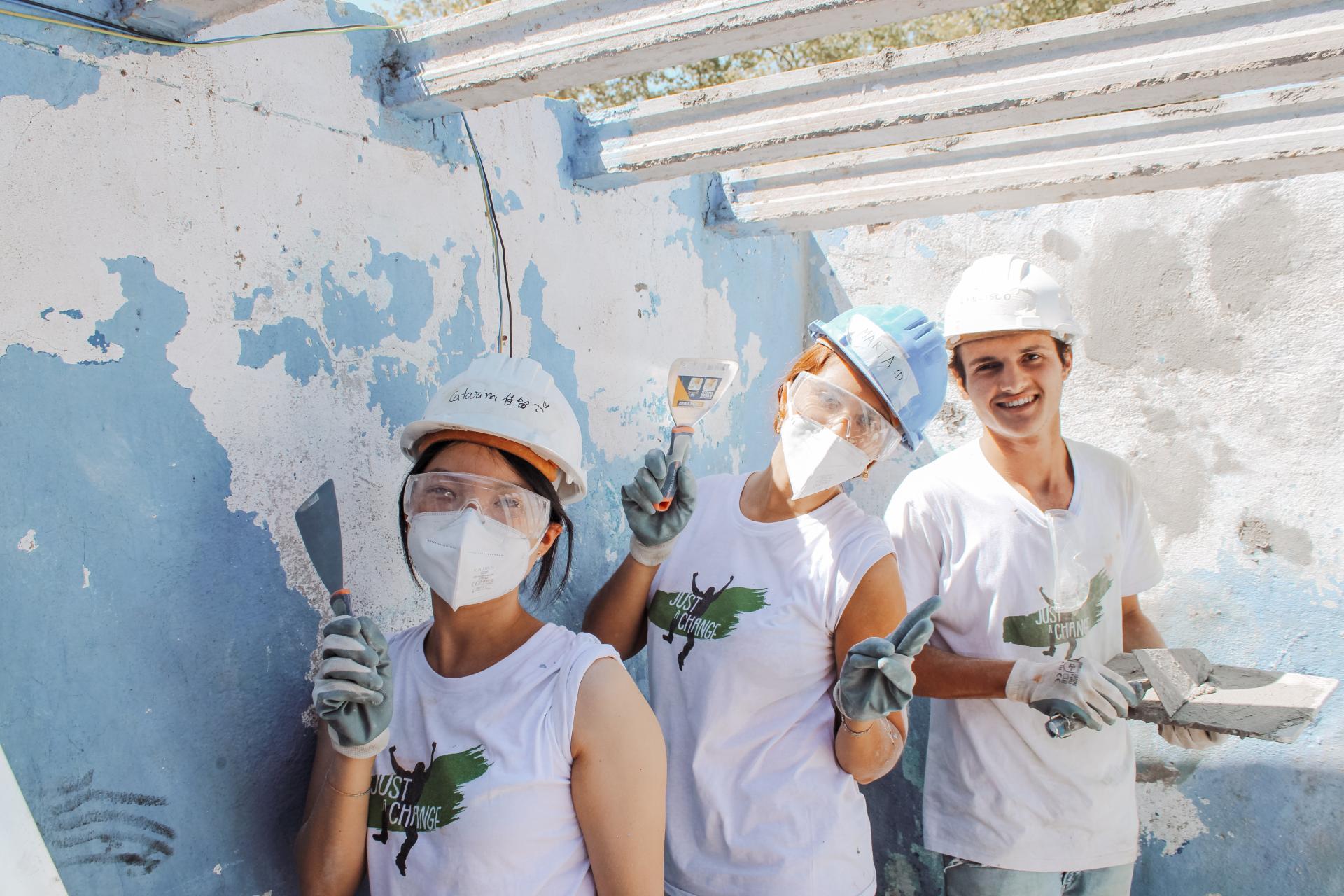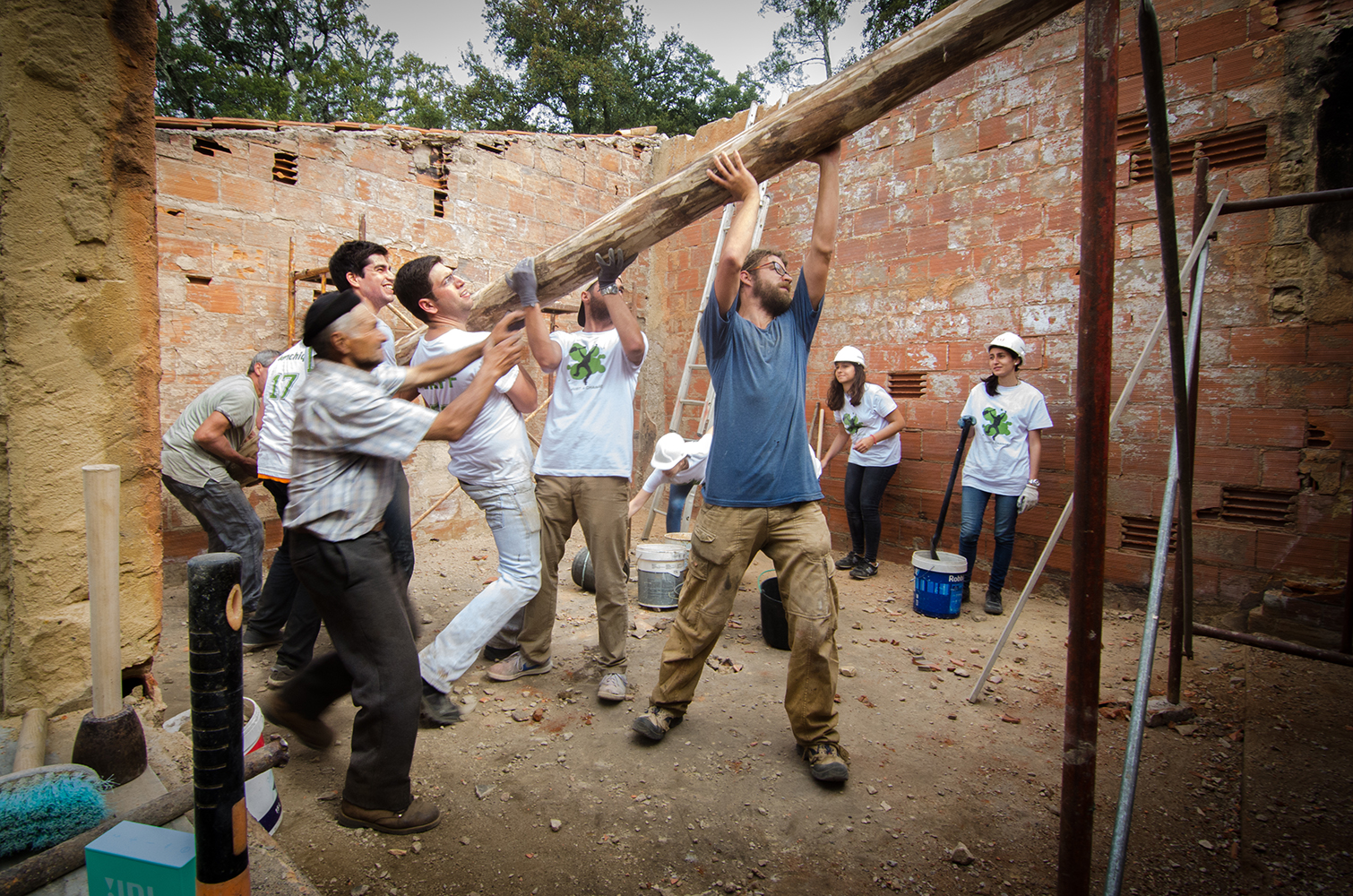Just a Change
Basic information
Project Title
Just a Change
Full project title
Just a Change - Odemira, Alcanena, Ferreira do Zêzere
Category
Prioritising the places and people that need it the most
Project Description
We renovate houses without roofs, where there is no hot water, nor electricity. Where it’s cold. We renovate homes because it can be the starting point of a new life and improves health and energetic efficiency.
We rebuild lives because we bring volunteers full of joy to people’s homes, because we mobilize the community to help and recover their neighborhood, because home is the most important place in the world, and we all deserve to have one.
RENOVATING HOMES, REBUILDING LIVES
We rebuild lives because we bring volunteers full of joy to people’s homes, because we mobilize the community to help and recover their neighborhood, because home is the most important place in the world, and we all deserve to have one.
RENOVATING HOMES, REBUILDING LIVES
Geographical Scope
National
Project Region
Portugal
Urban or rural issues
Mainly rural
Physical or other transformations
It refers to a physical transformation of the built environment (hard investment)
EU Programme or fund
Yes
Which funds
Horizon2020 / Horizon Europe
Description of the project
Summary
Living in housing deprivation means living in a house where many of the basic needs are missing, jeopardizing a dignified daily life. These are homes where the lack of solid structures can’t protect from the cold and rain; where the absence of piped water makes it impossible to go to the bathroom or take shower (particularly a hot shower); where the lighting and ventilation are so inadequate, they inhibit reading, learning, or breathing proper clean air. These homes aren’t safe to live in, let alone provide shelter, promote wellness and comfort. Those who live in such houses can’t enjoy their homes as they lack a place that meets their emotional, learning and development needs. According to the Portuguese National Institute of Statistics (INE), 3,9% of the population lived under these conditions in 2020.
Housing deprivation is also the first cause of Energy Poverty in Portugal. This means not having access to the appropriate amount of energy to meet daily needs. Deficient building structures lead to energy inefficiencies, requiring an excessive amount of energy to light, clean, cook and heat the house. High energetic needs combined with a weak economic situation throws many families into Energy Poverty. In 2019, 18,9% of the Portuguese population couldn’t keep their house properly heated.
Just a Change was founded as a response to this crisis, focused on renovating the homes of those in need. Improving living conditions reduces health and safety risks. Renovating a house offers its inhabitants a new starting point for their lives.
We work both in in rural contexts and large metropolitan areas. Metropolitan areas (of Lisbon and Porto) have seen in the past few years steep increase in housing costs, and unemployment rates are higher than the national average (6,5% in Portugal and 7,1% in LMA). On another hand, the desertification of rural areas means we have very isolated communities, with many elderly people with no support network, living off low-paying pension
Housing deprivation is also the first cause of Energy Poverty in Portugal. This means not having access to the appropriate amount of energy to meet daily needs. Deficient building structures lead to energy inefficiencies, requiring an excessive amount of energy to light, clean, cook and heat the house. High energetic needs combined with a weak economic situation throws many families into Energy Poverty. In 2019, 18,9% of the Portuguese population couldn’t keep their house properly heated.
Just a Change was founded as a response to this crisis, focused on renovating the homes of those in need. Improving living conditions reduces health and safety risks. Renovating a house offers its inhabitants a new starting point for their lives.
We work both in in rural contexts and large metropolitan areas. Metropolitan areas (of Lisbon and Porto) have seen in the past few years steep increase in housing costs, and unemployment rates are higher than the national average (6,5% in Portugal and 7,1% in LMA). On another hand, the desertification of rural areas means we have very isolated communities, with many elderly people with no support network, living off low-paying pension
Key objectives for sustainability
Deficient Buildings represent large emissions of CO2, since these dwellings need excessive amounts of energy to function. By renovating these homes, Just a Change is actively fighting energy poverty, converting the buildings into sustainable and efficient structures where people can live comfortably. Our renovations focus on essential and passive measures, such as insulating and repairing contact surfaces like roofs; renewing windows, and doors; repairing plumbing and electrical network, and replacing outdated appliances.
Besides, we are developing the use of material and techniques as green and sustainable as possible. When choosing material, we focus on selecting the most sustainable ones, such as privileging mineral wools to insulate, instead of PVC panels. Additionally, we already conducted some studies and implemented processes to reduce water usage in every worksite, and we are constantly studying new materials and techniques to apply in renovations.
We also believe in supporting local synergies, mobilizing the local community, and allowing a better use of resources by injecting money in the local economy and making the solution more efficient and sustainable. We strive to source local suppliers and workforce, believing we bring the community closer to the beneficiary, promoting bonding and reverting social exclusion.
Besides, we are developing the use of material and techniques as green and sustainable as possible. When choosing material, we focus on selecting the most sustainable ones, such as privileging mineral wools to insulate, instead of PVC panels. Additionally, we already conducted some studies and implemented processes to reduce water usage in every worksite, and we are constantly studying new materials and techniques to apply in renovations.
We also believe in supporting local synergies, mobilizing the local community, and allowing a better use of resources by injecting money in the local economy and making the solution more efficient and sustainable. We strive to source local suppliers and workforce, believing we bring the community closer to the beneficiary, promoting bonding and reverting social exclusion.
Key objectives for aesthetics and quality
In a larger scale, renovating houses in poor conditions contributes directly to the promotion and valuation of large cities, where disparities and unequal access to housing is more severe; and in villages, reinforcing their local identity. We always keep the architectural traits of these homes, respecting the local aesthetic line and building identity. Typical details are therefore kept, to ensure continuity and maintenance of traditional construction landscape.
In terms of quality of experience, we are delivering modern, renovated homes to those who can’t afford them, assuring they have the same access to better housing structures and appliances. We engage the beneficiary to understand what house features are most valuable to the person, and how we can include and value them it in the renovation.
The identity of these communities is, therefore, reinforced; also, by bringing dignity, joy and hope channeled through the volunteers. This work mitigates the effects of the recent gentrification felt in the large urban areas.
In terms of quality of experience, we are delivering modern, renovated homes to those who can’t afford them, assuring they have the same access to better housing structures and appliances. We engage the beneficiary to understand what house features are most valuable to the person, and how we can include and value them it in the renovation.
The identity of these communities is, therefore, reinforced; also, by bringing dignity, joy and hope channeled through the volunteers. This work mitigates the effects of the recent gentrification felt in the large urban areas.
Key objectives for inclusion
Just a Change was founded as a response to the housing crisis, focused on renovating the homes of those in need. We designed three different volunteer-based models, to be able to serve all kinds of communities and locations, each one with different purposes. Keep Up is set in urban areas, Camp In takes us to rural areas; both focused on renovating private homes. The All-In program was designed to provide renovation to institutions and improve the conditions of these organizations that serve a large population.
Housing Deprivation has a lack of responses facing the existent needs. There are no public policies to support renovations on low-income houses, especially for private owners; there are obviously no construction companies focusing on a segment of clients unable to pay for their intervention.
Our solution doesn’t imply a mobilization to municipal housing, the State’s prime solution, which creates ghettos and marginalizes the targeted audience. Our solution does not require moving the beneficiary elsewhere. By participating on the renovation process, Just a Change focuses on maintaining the beneficiary’s emotional bonds with the house, the memories and the continuity of belonging in their community, preventing them from leaving their roots. We are promoting the (re)integration of the family or underprivileged person, by taking them as part of the solution, promoting their involvement, and assuring they are part of the renovation process, therefore giving back their self-esteem and appreciation for their shelter. This also prevents further isolation of this population.
Housing Deprivation has a lack of responses facing the existent needs. There are no public policies to support renovations on low-income houses, especially for private owners; there are obviously no construction companies focusing on a segment of clients unable to pay for their intervention.
Our solution doesn’t imply a mobilization to municipal housing, the State’s prime solution, which creates ghettos and marginalizes the targeted audience. Our solution does not require moving the beneficiary elsewhere. By participating on the renovation process, Just a Change focuses on maintaining the beneficiary’s emotional bonds with the house, the memories and the continuity of belonging in their community, preventing them from leaving their roots. We are promoting the (re)integration of the family or underprivileged person, by taking them as part of the solution, promoting their involvement, and assuring they are part of the renovation process, therefore giving back their self-esteem and appreciation for their shelter. This also prevents further isolation of this population.
Results in relation to category
Since 2010, Just a Change has already renovated more than 410 houses, impacting more than 865 beneficiaries, mobilizing more than 7850 volunteers to rebuild these houses and more than 140 other social institutions. All this was performed in 32 different municipalities of Portugal.
In 2022 alone, we renovated 66 homes of 137 beneficiaries, 37 institutions (serving more than 3500 beneficiaries), in 14 municipalities. To achieve this, we counted on 925 volunteers and 2768 corporate volunteers.
The need of having records that validate Just a Change’s work led to the creation of a team dedicated to Impact Measurement. The team is formed mainly by volunteers, professionally trained in the areas of psychology and sociology. This team visits each beneficiary before and after the intervention to conduct interviews that help us assess the impact of our interventions, in the many areas of life we support. Thanks to these interviews, we can analyze many parameters such as: comfort, well-being, feeling of safety of our beneficiaries. We have 3 different levels of impact indicators, which we measure annually and are published on our Annual Impact Report, attached to this application.
OUTPUT INDICATORS
Numbers directly representing the work of Just a Change during the year:
// Number of renovated homes
// Number of beneficiaries supported
// Number of volunteers
OUTCOME INDICATORS
Numbers that intend to show the direct consequences of Just a Change’s intervention:
// State of conservation of the house
// Living Conditions
// Energetic efficiency
// Health and safety risks reduction
IMPACT INDICATORS
Change recorded in the life of the beneficiaries one year after the intervention in the following areas:
// Health and hygiene
// Comfort and well-being
// Security and protection
// Social integration
// Autonomy and education
In 2022 alone, we renovated 66 homes of 137 beneficiaries, 37 institutions (serving more than 3500 beneficiaries), in 14 municipalities. To achieve this, we counted on 925 volunteers and 2768 corporate volunteers.
The need of having records that validate Just a Change’s work led to the creation of a team dedicated to Impact Measurement. The team is formed mainly by volunteers, professionally trained in the areas of psychology and sociology. This team visits each beneficiary before and after the intervention to conduct interviews that help us assess the impact of our interventions, in the many areas of life we support. Thanks to these interviews, we can analyze many parameters such as: comfort, well-being, feeling of safety of our beneficiaries. We have 3 different levels of impact indicators, which we measure annually and are published on our Annual Impact Report, attached to this application.
OUTPUT INDICATORS
Numbers directly representing the work of Just a Change during the year:
// Number of renovated homes
// Number of beneficiaries supported
// Number of volunteers
OUTCOME INDICATORS
Numbers that intend to show the direct consequences of Just a Change’s intervention:
// State of conservation of the house
// Living Conditions
// Energetic efficiency
// Health and safety risks reduction
IMPACT INDICATORS
Change recorded in the life of the beneficiaries one year after the intervention in the following areas:
// Health and hygiene
// Comfort and well-being
// Security and protection
// Social integration
// Autonomy and education
How Citizens benefit
Our model in a volunteer-based one. We mobilize young volunteers, believing it is through their dedication and engagement that transformation happens. Most of them are Portuguese students coming from all over the country, who volunteer in the large urban cities during the school year, and then get in touch with unfamiliar and isolated areas of Portugal in the summer activities. The volunteers’ youth bring energy and joy to an often-isolated population, giving back hope, dignity, and joy. The bond between volunteers and beneficiaries leads to an endless source of happiness, energy, and exchange between generations.
The involvement of volunteers and of local social agents creates an ecosystem aware of Housing Deprivation, which is usually a distant and unspoken issue. Young volunteers face the renovation works as a mission of service and not as a job or task. It also contributes to the development of leadership and a generation more conscious of social issues.
The direct beneficiaries take this opportunity to rebuild their lives! We’ve had people going back to work, starting to engage and volunteering in their local community, being able to offer a safe home for their family and children. These and many other impactful stories give us the energy to keep working and growing, to ensure we reach all those in need.
The involvement of volunteers and of local social agents creates an ecosystem aware of Housing Deprivation, which is usually a distant and unspoken issue. Young volunteers face the renovation works as a mission of service and not as a job or task. It also contributes to the development of leadership and a generation more conscious of social issues.
The direct beneficiaries take this opportunity to rebuild their lives! We’ve had people going back to work, starting to engage and volunteering in their local community, being able to offer a safe home for their family and children. These and many other impactful stories give us the energy to keep working and growing, to ensure we reach all those in need.
Physical or other transformations
It refers to a physical transformation of the built environment (hard investment)
Innovative character
Other solutions have arisen in Portugal, but there is no other institution acting in the same manner as Just a Change: some focus on a specific target group such as the homeless, others have renovation programs where the beneficiary must pay and affordable mortgage over the renovated house. We differentiate ourselves by innovating through:
• Systemic solution to Housing Poverty – we act on the root of the problem by intervening on the central infrastructure: the house. The house is our instrument of social intervention, by including the beneficiary on the renovation as the central piece of the solution. Customizing each renovation to the needs of the person helps the beneficiary to feel supported and to (re)develop self-esteem and appreciation for the new home, which are key to “rebuild their life”.
• Scalability: by implementing a collaborative solution between public, private and social sectors, JAC maximizes impact in the local community. The intervention is set upon a financially sustainable model, and is adaptable to each community, counting on the participation of local entities. The process is therefore, easily replicable. Growing and expanding to new municipalities is a key strategic goal for the next few years.
• Economically viable: average costs of renovating a house are quite under market values. A 40sqm house costs, on average 10.000€ to Just a Change, instead of 30/35.000€ market values. This means that for the price of 1 intervention, JAC can multiply its impact by 3.
• Awareness: the involvement of volunteers and of local social agents creates an ecosystem aware of Housing Deprivation, which is usually a distant and unspoken issue. Young volunteers face the renovation works as a mission of service and not as a job or task. It also contributes to the development of leadership and a generation more conscious of social issues.
• Systemic solution to Housing Poverty – we act on the root of the problem by intervening on the central infrastructure: the house. The house is our instrument of social intervention, by including the beneficiary on the renovation as the central piece of the solution. Customizing each renovation to the needs of the person helps the beneficiary to feel supported and to (re)develop self-esteem and appreciation for the new home, which are key to “rebuild their life”.
• Scalability: by implementing a collaborative solution between public, private and social sectors, JAC maximizes impact in the local community. The intervention is set upon a financially sustainable model, and is adaptable to each community, counting on the participation of local entities. The process is therefore, easily replicable. Growing and expanding to new municipalities is a key strategic goal for the next few years.
• Economically viable: average costs of renovating a house are quite under market values. A 40sqm house costs, on average 10.000€ to Just a Change, instead of 30/35.000€ market values. This means that for the price of 1 intervention, JAC can multiply its impact by 3.
• Awareness: the involvement of volunteers and of local social agents creates an ecosystem aware of Housing Deprivation, which is usually a distant and unspoken issue. Young volunteers face the renovation works as a mission of service and not as a job or task. It also contributes to the development of leadership and a generation more conscious of social issues.
Disciplines/knowledge reflected
We are proud to have a model that brings together all three sectors: Public – through local Municipalities; Private - by involving companies and private suppliers and Social – through local charities; therefore, maximizing synergies between all these actors. They each have a vital role in our methodology (detailed below) and financial sustainability, and scalability.
• Financially sustainable model: through the maximization of local resources and suppliers, each intervention in our model is financed mostly locally. This allows an easy replication and expansion of the solution.
• Scalability: by implementing a collaborative solution between public, private and social sectors, JAC maximizes impact in the local community. The intervention is set upon a financially sustainable model, and is adaptable to each community, counting on the participation of local entities. The process is therefore, easily replicable. Growing and expanding to new municipalities is a key strategic goal for the next few years.
• Financially sustainable model: through the maximization of local resources and suppliers, each intervention in our model is financed mostly locally. This allows an easy replication and expansion of the solution.
• Scalability: by implementing a collaborative solution between public, private and social sectors, JAC maximizes impact in the local community. The intervention is set upon a financially sustainable model, and is adaptable to each community, counting on the participation of local entities. The process is therefore, easily replicable. Growing and expanding to new municipalities is a key strategic goal for the next few years.
Methodology used
Our methodology approach is built upon local cooperation to maximize social impact.
1. Mapping: We mobilize the local agents to screen and identify the families that live in a state of housing poverty.
2. Mobilizing: We visit the home, define and budget the intervention and plan, mobilize all the resources needed to the execution of the project (materials, logistics, volunteers, etc.)
3. Intervention/Renovation: We guarantee a close collaboration with all the local agents to maximize the social cohesion. During the renovation works, Just a Change focuses on creating a healthy and positive relationship with the beneficiaries. We challenge the beneficiaries to be part of the intervention committing them to their own recuperation. We have 3 different volunteer-based models:
a. Keep Up: program in place in the cities of Lisbon, Porto and Guimarães. Mainly with university students as volunteers, who commit themselves with a 4-hour shift/week and renovate the houses of those in need.
b. Camp In: an intensive 12-day summer camp program where a large group of 40 to 50 volunteers go to a countryside area to renovate 5 to 6 houses at the same time. This program is the most intense, since it allows a continuous presence of volunteers for a long period of days and makes it possible to have many renovations happening simultaneously. Due its scalability, it allows Just a Change to serve in more isolated and rural areas of Portugal.
c. All In: a one-day social team building program for companies and corporate volunteers.
4. Follow-up: We guarantee with the local partners that the changes performed in the beneficiaries’ lives do not disappear after the intervention. It is paramount to ensure the beneficiaries have dedicated support, to ensure their reintegration.
1. Mapping: We mobilize the local agents to screen and identify the families that live in a state of housing poverty.
2. Mobilizing: We visit the home, define and budget the intervention and plan, mobilize all the resources needed to the execution of the project (materials, logistics, volunteers, etc.)
3. Intervention/Renovation: We guarantee a close collaboration with all the local agents to maximize the social cohesion. During the renovation works, Just a Change focuses on creating a healthy and positive relationship with the beneficiaries. We challenge the beneficiaries to be part of the intervention committing them to their own recuperation. We have 3 different volunteer-based models:
a. Keep Up: program in place in the cities of Lisbon, Porto and Guimarães. Mainly with university students as volunteers, who commit themselves with a 4-hour shift/week and renovate the houses of those in need.
b. Camp In: an intensive 12-day summer camp program where a large group of 40 to 50 volunteers go to a countryside area to renovate 5 to 6 houses at the same time. This program is the most intense, since it allows a continuous presence of volunteers for a long period of days and makes it possible to have many renovations happening simultaneously. Due its scalability, it allows Just a Change to serve in more isolated and rural areas of Portugal.
c. All In: a one-day social team building program for companies and corporate volunteers.
4. Follow-up: We guarantee with the local partners that the changes performed in the beneficiaries’ lives do not disappear after the intervention. It is paramount to ensure the beneficiaries have dedicated support, to ensure their reintegration.
How stakeholders are engaged
Eradicating housing poverty will always depend on the joint effort of many sectors; therefore, we engage many partners:
• Municipalities and local authorities, and local foundations help to fund operations and help Just a Change to boost local economies by employing local contractors. They are also critical in screening the intervention cases, providing local warehouses and accommodation. We act regularly on repeated locations, showing local communities and Municipalities believe in our approach and see the benefits of our interventions. Locals always receive us warmly, helping in every way they can.
• Private companies help us achieve our goal, whether by supporting us on the housing and energy poverty topic, or by in-kind donations of construction material. Some of them are Strategic Partners: companies connected to the construction, home and energy sectors that support us financially or with in-kind donations. EDP (Portuguese electric company), IKEA, Leroy Merlin, Saint-Gobain, Hertz, are some examples.
• NGO’s and institutions help us identify and map cases of housing poverty and provide post-renovation support to the beneficiary when needed.
• Private Donations, funds, and philanthropy: fundraising campaigns (Christmas campaign, etc.), awards and European funds. The latter support the development of specific project. We joined our first European Consortium in 2022, entering a cross-border project fighting against energy poverty. In 2022 we also got first collaboration with Lisbon City Hall within a program part of the Recovery Plan form the pandemic.
• Municipalities and local authorities, and local foundations help to fund operations and help Just a Change to boost local economies by employing local contractors. They are also critical in screening the intervention cases, providing local warehouses and accommodation. We act regularly on repeated locations, showing local communities and Municipalities believe in our approach and see the benefits of our interventions. Locals always receive us warmly, helping in every way they can.
• Private companies help us achieve our goal, whether by supporting us on the housing and energy poverty topic, or by in-kind donations of construction material. Some of them are Strategic Partners: companies connected to the construction, home and energy sectors that support us financially or with in-kind donations. EDP (Portuguese electric company), IKEA, Leroy Merlin, Saint-Gobain, Hertz, are some examples.
• NGO’s and institutions help us identify and map cases of housing poverty and provide post-renovation support to the beneficiary when needed.
• Private Donations, funds, and philanthropy: fundraising campaigns (Christmas campaign, etc.), awards and European funds. The latter support the development of specific project. We joined our first European Consortium in 2022, entering a cross-border project fighting against energy poverty. In 2022 we also got first collaboration with Lisbon City Hall within a program part of the Recovery Plan form the pandemic.
Global challenges
Unfortunately, Portugal is not the only country facing issues of housing deprivation.
Eurostat measures, in the EU, housing quality by looking at certain housing deficiencies:
● Lack of bath or shower
● Lack of indoor flushing toilet for sole use of the household
● leaking roof/damp walls/floors/foundation or rot in window frames
● Darkness of the accommodation
In 2015, 15,3 % of Europeans (EU28) suffered from one of these dwelling problems. The main housing problem was found to be the ‘leaking roof’ (i.e. leaking roof or damp walls, floors or foundation, or rot in window frames of floor’) (15.2 %), followed by ‘darkness of the dwelling’ (5.5 %), while around 2.4 % of the EU population lacked basic sanitary facilities (i.e. lack of bath/shower or indoor flushing toilet). (EU-SILC database)
But the problem is global and found in the entire world. According to Our World In Data, in 2020, just over half (54%) of the world population had access to safely managed sanitation. Around 6% do not have any sanitation facilities at all. Furthermore, in OECD countries, Mexico and Romania record the highest rates of severe housing deprivation, where over 7% of the population in middle-income households and at least 26% of the population in the bottom quintile of the income distribution live in overcrowded dwellings that lack a flushing toilet. (OECD, OECD Affordable Housing Database, 2022).
Aware of these numbers and facts, we believe our model has proven to be an effective way to revert these situations, while working on a larger plan than the house itself. We act locally, engage locally, but with a replicable model that can be taken to other regions.
Eurostat measures, in the EU, housing quality by looking at certain housing deficiencies:
● Lack of bath or shower
● Lack of indoor flushing toilet for sole use of the household
● leaking roof/damp walls/floors/foundation or rot in window frames
● Darkness of the accommodation
In 2015, 15,3 % of Europeans (EU28) suffered from one of these dwelling problems. The main housing problem was found to be the ‘leaking roof’ (i.e. leaking roof or damp walls, floors or foundation, or rot in window frames of floor’) (15.2 %), followed by ‘darkness of the dwelling’ (5.5 %), while around 2.4 % of the EU population lacked basic sanitary facilities (i.e. lack of bath/shower or indoor flushing toilet). (EU-SILC database)
But the problem is global and found in the entire world. According to Our World In Data, in 2020, just over half (54%) of the world population had access to safely managed sanitation. Around 6% do not have any sanitation facilities at all. Furthermore, in OECD countries, Mexico and Romania record the highest rates of severe housing deprivation, where over 7% of the population in middle-income households and at least 26% of the population in the bottom quintile of the income distribution live in overcrowded dwellings that lack a flushing toilet. (OECD, OECD Affordable Housing Database, 2022).
Aware of these numbers and facts, we believe our model has proven to be an effective way to revert these situations, while working on a larger plan than the house itself. We act locally, engage locally, but with a replicable model that can be taken to other regions.
Learning transferred to other parties
Replication and growth have always been a key strategic line to Just a Change. With offices and yearlong activities in Lisbon and Porto (and now starting in Guimarães), the project has expanded and engaged in activities in 32 different municipalities. This means our model and methodology are easily replicable and transferable.
In 2021 our newly elected board took time to think and design a 5-year strategic plan for the years 2022-2026. The main goal of the new Strategic Plan is to reach 120 houses renovated per year, in 2026, and thus expand the number of direct beneficiaries, while preserving the current model.
Since we’ve already scaled to many different locations, we are aware there will be always a trade-off between growth and keeping the essence of culture and values of the early days. We learned it is crucial to invest on ways to promote and teach our values and culture in the most effective way. We also learned that we must define what is key for us (ex: how to engage with the beneficiary, keep the reconstruction work with a volunteering model) and should be constant in all interventions, and what can be flexible and managed locally (daily schedule, after-hours activities, etc.).
Each new place has its own specificities. Although our model is very straightforward to be able to be applied everywhere, local partners will always demand a certain amount of adaptation. Like in the previous item, we learned where we can be flexible, and where we must stand our ground, not to compromise our values.
However, as our impact grows, and we expand to other worksites, we must ensure our core values and the volunteer’s spirit is kept in every activity run by internal management or by external replicators. To guarantee the values and spirit are present, we are betting on volunteer training, especially for those who coordinate activities. Additionally, in every activity, we select a mix of experienced and repeating volunteers and first-time volunteers.
In 2021 our newly elected board took time to think and design a 5-year strategic plan for the years 2022-2026. The main goal of the new Strategic Plan is to reach 120 houses renovated per year, in 2026, and thus expand the number of direct beneficiaries, while preserving the current model.
Since we’ve already scaled to many different locations, we are aware there will be always a trade-off between growth and keeping the essence of culture and values of the early days. We learned it is crucial to invest on ways to promote and teach our values and culture in the most effective way. We also learned that we must define what is key for us (ex: how to engage with the beneficiary, keep the reconstruction work with a volunteering model) and should be constant in all interventions, and what can be flexible and managed locally (daily schedule, after-hours activities, etc.).
Each new place has its own specificities. Although our model is very straightforward to be able to be applied everywhere, local partners will always demand a certain amount of adaptation. Like in the previous item, we learned where we can be flexible, and where we must stand our ground, not to compromise our values.
However, as our impact grows, and we expand to other worksites, we must ensure our core values and the volunteer’s spirit is kept in every activity run by internal management or by external replicators. To guarantee the values and spirit are present, we are betting on volunteer training, especially for those who coordinate activities. Additionally, in every activity, we select a mix of experienced and repeating volunteers and first-time volunteers.
Keywords
Housing Poverty
Energy Poverty
Poverty Alleviation
Dignified housing for all
Inclusion

